
Sep 6
/
Laleska Moda
Brazilian spread between arabica and robusta is already on negative levels
Back to main blog page
- In recent weeks, both robusta and arabica prices have risen in the Brazilian domestic market. However, robusta has seen a greater appreciation, surpassing arabica values this week. The last time prices of the varieties had this behavior was in January of 2017.
- The Cepea/ESALQ Coffee Indicator for the Robusta neared 1,490 BRL/bag in the last few days, while the Arabica Indicator remained ate 1,440 BRL/bag levels, leading the spread between varieties to reach negative numbers.
- In addition to the recent increase in London contracts, many growers in Brazil are holding their beans, while demand for Brazilian conilon is high amid lower availability in Asia, which is also supporting domestic prices.
- As for futures prices, the recent rally in robusta contracts has also led the arbitrage between the two coffees to historically low levels. Export data from Vietnam and Indonesia continue to highlight tight robusta supply.
- The market also remains highly volatile as weather-related risks loom on the horizon. Aside from our expectations of lower inputs in the Vietnamese 24/25 crop, warm and dry weather is expected to continue in Brazil in the coming days, increasing downside risks to the 25/26 coffee development.
Brazilian spread between arabica and robusta is already on negative levels
Arabica and robusta prices Brazilian domestic prices increased between August and early September. However, the intensity of the rise was different for each variety, with Robusta prices more strongly appreciated. On Wednesday, the Cepea/ESALQ Robusta Indicator reached its highest level of the week at 1,488.34 BRL/bag, while the Arabica Indicator closed at 1,443.45 BRL/bag, with a spread of -44.89 BRL/bag (Arabica prices were 3% lower than Robusta).
It is good to note that the last time the spread was negative (robusta prices were higher than arabica) was in January 2017. In Brazil, besides the increase in London prices, many growers are holding their beans as the Brazilian conilon continues to be well demanded, given the current tight global supplies, which is also given support to domestic prices.
Robusta futures are also appreciating at a faster pace than those of arabica - despite some price correction in the latter part of this week - resulting in low arbitrage levels between the two, close to 20 cents/lb.
Cepea/ESALQ Arabica and Robusta Indicators (BRL/bags)
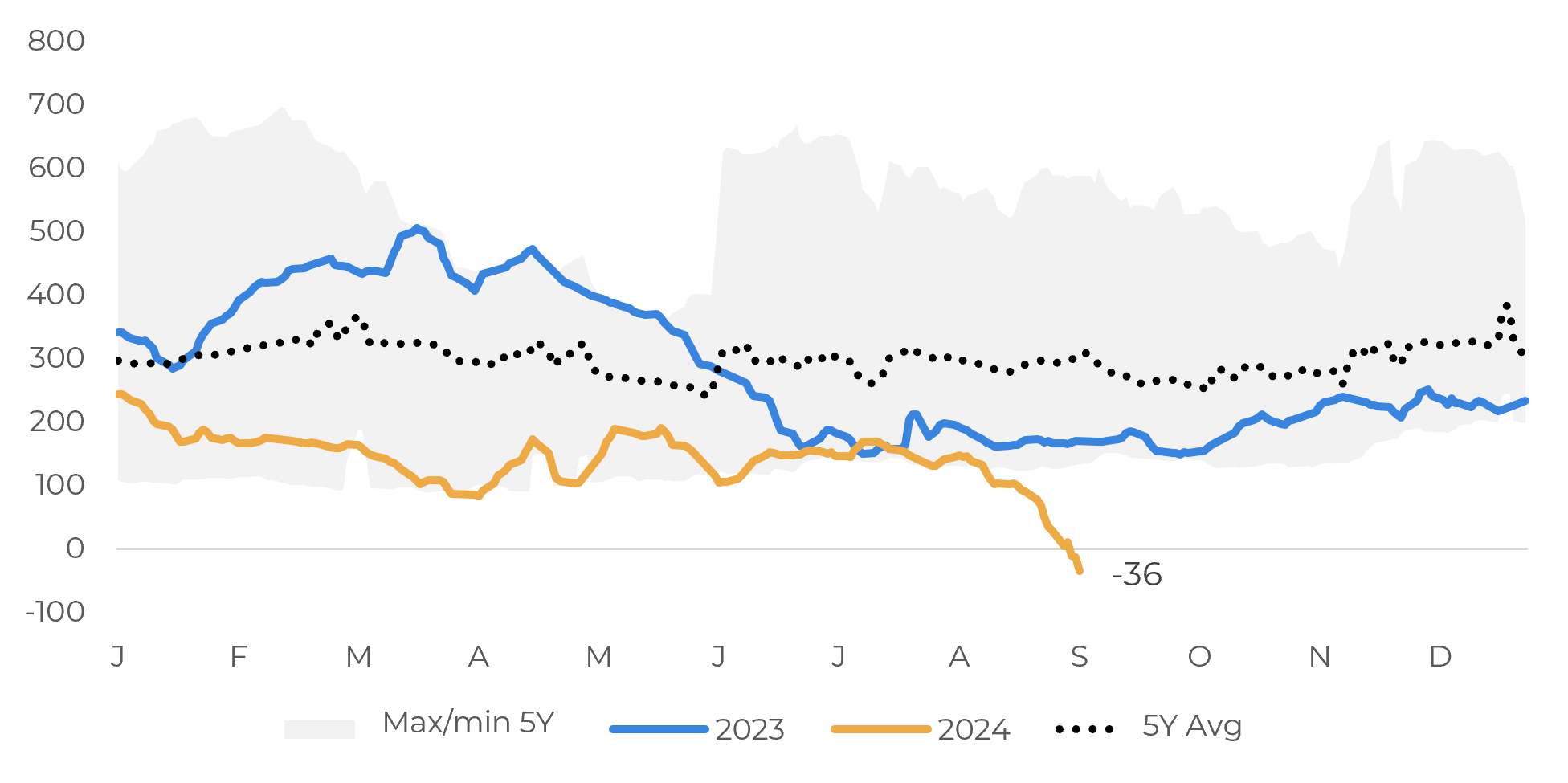
Source: Cepea/ESALQ, Hedgepoint
NY Arabica (c/lb) - LN Robusta (USD/mt) – Abritrage (2nd Contract)
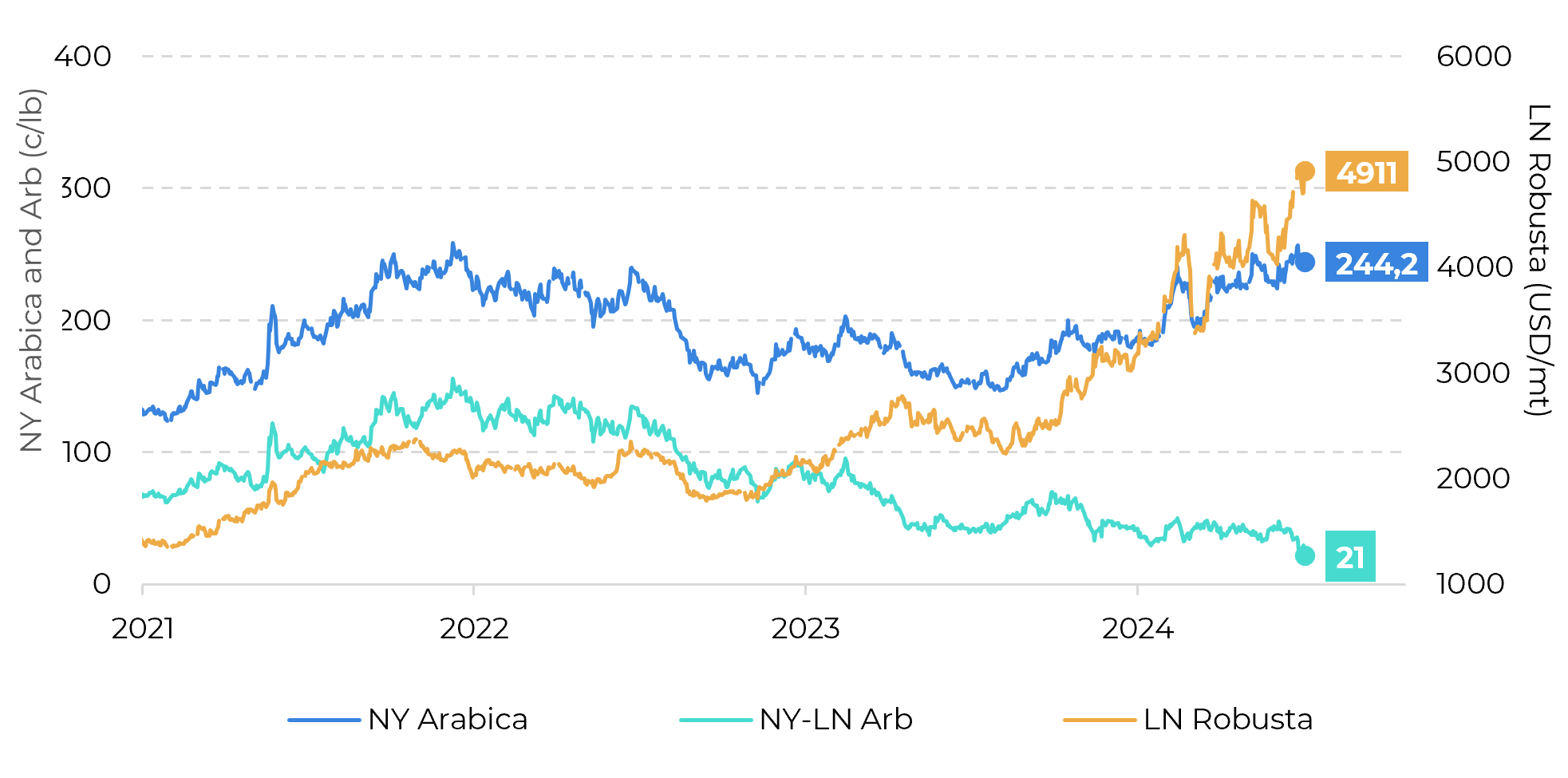
Source: Refinitiv
Globally, robusta has been supported by the smaller 23/24 crop in Indonesia and Vietnam and the resulting lower availability in recent months. While the Indonesian 24/25 season is set to recover, the latest export data still shows below average shipments. Export data for the first three months of the 24/25 season (apr-jun) shows a cumulative volume of 786k bags, down 33.4% from the 23/24 cumulative and down 44.7% from the historical average.
In Vietnam, export data also supports lower stocks in the country. August shipments were 13.8% lower than Aug/23 and 34.8% lower than the 1.8 M bags average for the month. Cumulative figures for 23/24 show a 10.4% decline from 22/23 and down 6% y/y to 23.7M bags. However, low export levels could be repeated in the coming season of 24/25 in Vietnam, as adverse weather conditions are likely to affect production until mid-2024.
Given the current scenario, we expect the availability of Robusta to remain limited in 24/25 and with spreads between the variety and Arabica likely to remain low in the coming months. However, it is good to note that the current arbitrage is already leading to a shift in consumption towards Arabica in some countries (such as Brazil) and could lead to a reversal of the trend in the long term.
Indonesia Coffee Exports (M bags)
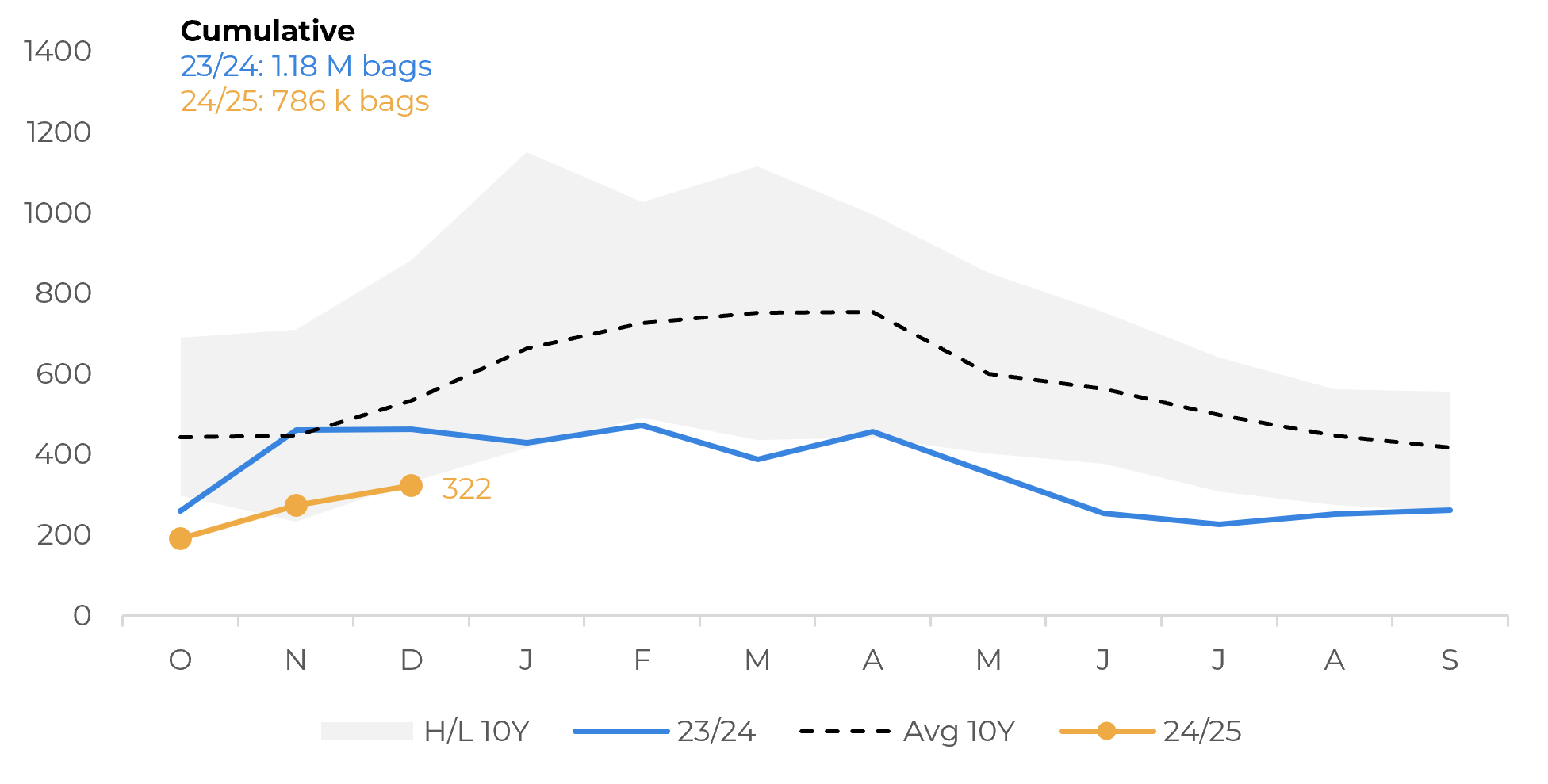
Source: Bank Indonesia
Vietnam Coffee Exports (M bags)
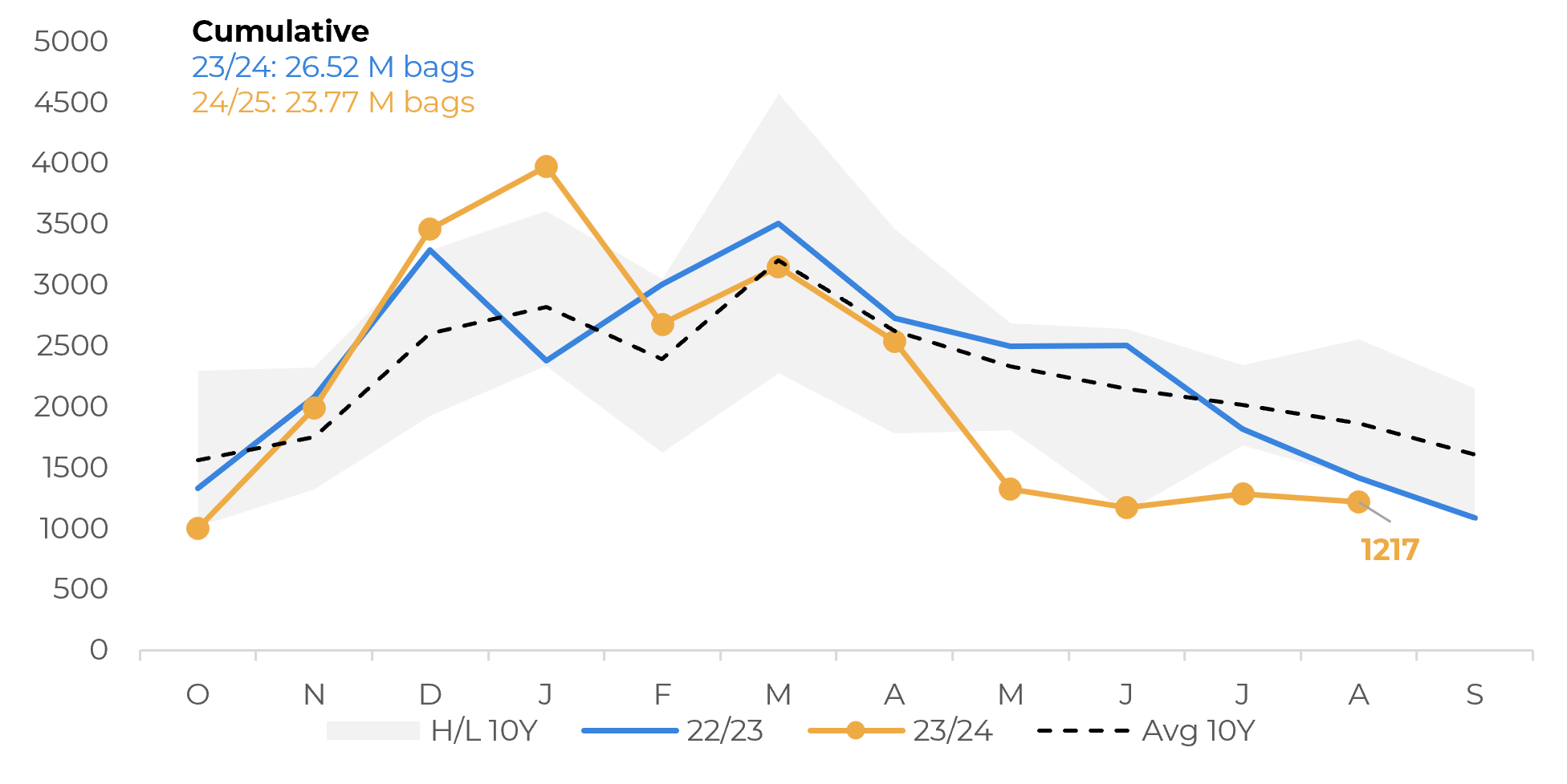
Source: Refinitiv
Another point we need to consider is that weather risks are also increasing in Brazil, as we mentioned in previous analysis (link). Forecasts for September point to higher temperatures and the continuation of dry weather, specially in arabica regions. Albeit still in small scale, blooming for the 25/26 has been reported across the country, increasing downside risks to coffee development as current cumulative rainfall and soil moisture are below average levels. In this sense, if rainfall does not return to coffee regions at higher volumes in the second half of the month and temperatures continue to be high, prices could find support in the coming weeks.
Soil Moisture – South of Minas – Brazil (mm)
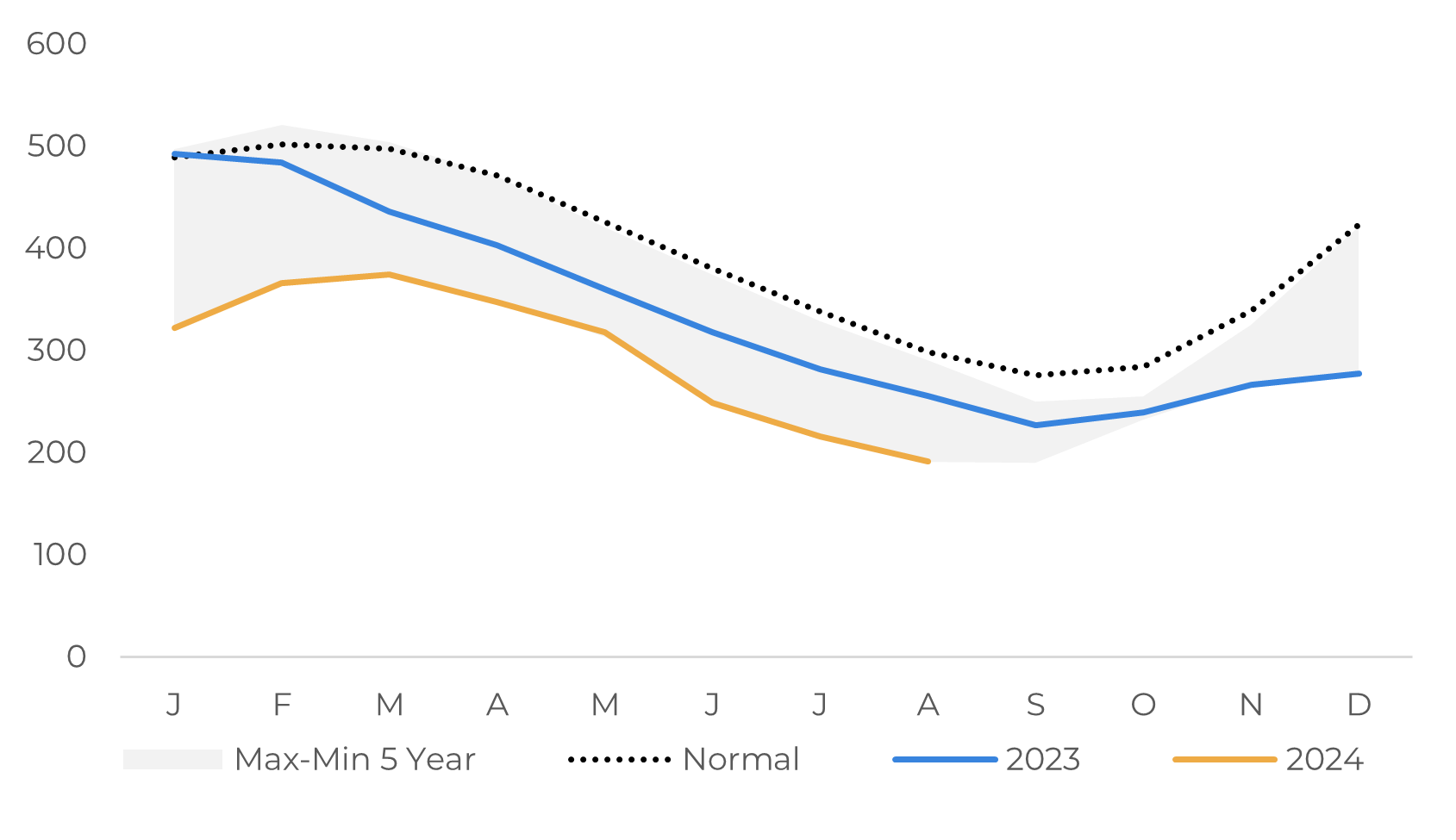
Source: Refinitv
Precipitation (mm) and Temperature (°C) Anomaly – Brazil – Sep.
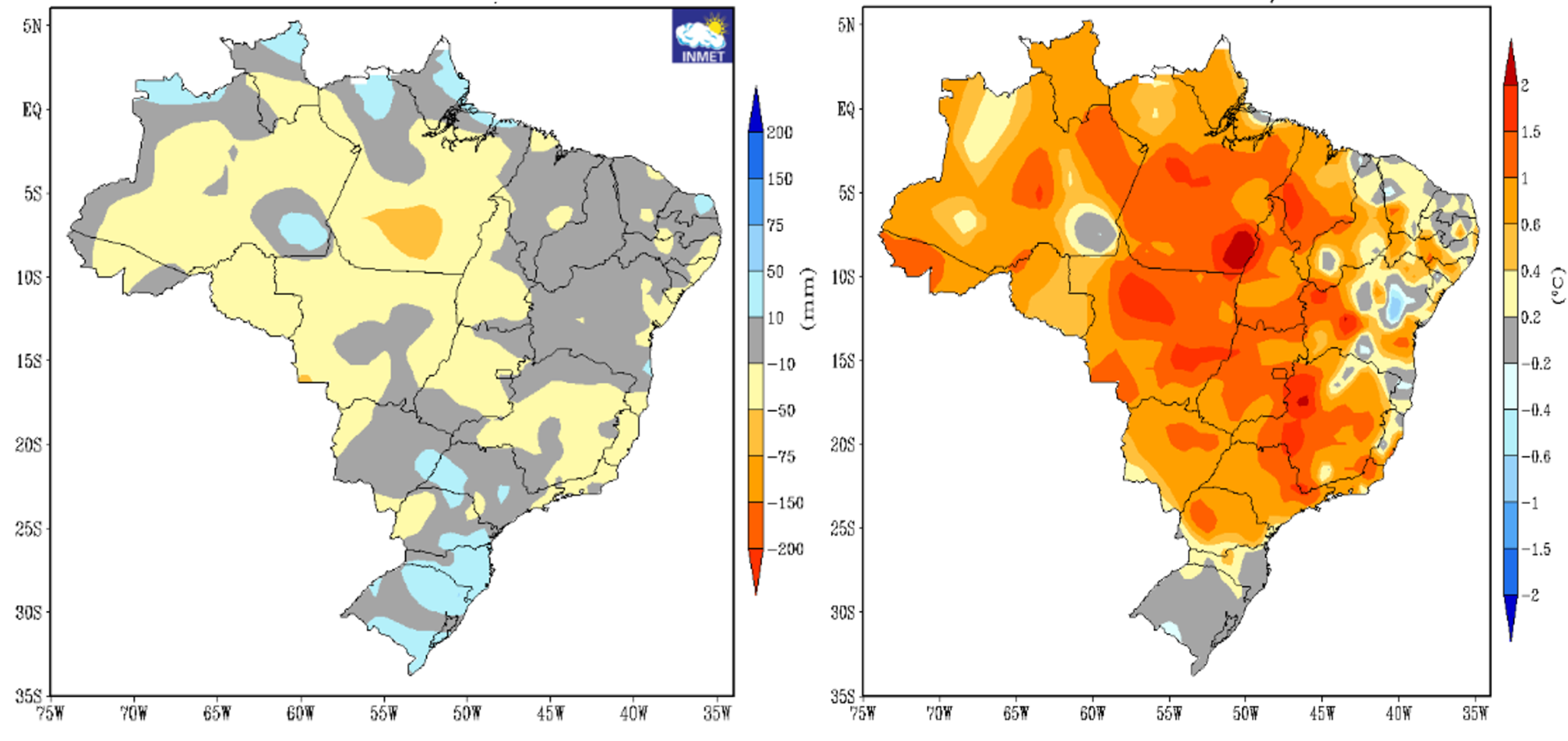
Source: Inmet
In Summary
Brazilian prices for Robusta have risen faster than those for Arabica in recent weeks, with the former outperforming the latter this week, leading to a negative spread between the two.
This scenario reflects both a retreat by Brazilian producers and the rally in robusta futures in recent weeks. In this respect, the arbitrage between LN and NY is positive, but has reached extremely low levels in recent days on the prospect of a tight supply of robusta. In Southeast Asia, exports from the two main producers (Vietnam and Indonesia) remain below historical averages and the outlook for the Vietnam 24/25 crop is not as positive, which could keep the arbitrage at lower levels in the coming months.
However, there are a few points to bear in mind. First, the current arbitrage could affect robusta demand in the medium to long term. In addition, weather risks are increasing in Brazil as the weather remains dry and warm. The situation is particularly worrying for the arabica areas, and if higher rainfall does not return to the producing regions by the end of September, we could see some support for prices, especially for arabica.
Weekly Report — Coffee
Written by Laleska Moda
laleska.moda@hedgepointglobal.com
Reviewed by Iganacio Espinola
ignacio.espinola@hedgepointglobal.com
ignacio.espinola@hedgepointglobal.com
www.hedgepointglobal.com
Disclaimer
This document has been prepared by Hedgepoint Global Markets LLC and its affiliates (“HPGM”) solely for informational and instructional purposes, without the purpose of instituting obligations or commitments to third parties, nor is it intended to promote an offer, or solicitation of an offer of sale or purchase relating to any securities, commodities interests or investment products. Hedgepoint Commodities LLC (“HPC”), a wholly owned entity of HPGM, is an Introducing Broker and a registered member of the National Futures Association. The trading of commodities interests such as futures, options, and swaps involves substantial risk of loss and may not be suitable for all investors. Past performance is not necessarily indicative of future results. Customers should rely on their own independent judgement and outside advisors before entering in any transaction that are introduced by the firm. HPGM and its associates expressly disclaim any use of the information contained herein that directly or indirectly result in damages or damages of any kind. In case of questions not resolved by the first instance of customer contact (client.services@hedgepointglobal.com), please contact our internal ombudsman channel (ombudsman@hedgepointglobal.com) or 0800-878- 8408/ouvidoria@hedgepointglobal.com (only for customers in Brazil)
Contact us
hedgepointhub.support@hedgepointglobal.com
ouvidoria@hedgepointglobal.com
Funchal Street, 418, 18º floor - Vila Olímpia São Paulo, SP, Brasil
Check our general terms and important notices.
This page has been prepared by Hedgepoint Schweiz AG and its affiliates (“Hedgepoint”) solely for informational and instructional purposes, without the purpose of instituting obligations or commitments to third parties, nor is it intended to promote an offer, or solicitation of an offer of sale or purchase relating to any securities, commodities interests or investment products. Hedgepoint and its associates expressly disclaim any use of the information contained herein that directly or indirectly result in damages or damages of any kind. Information is obtained from sources which we believe to be reliable, but we do not warrant or guarantee the timeliness or accuracy of this information. The trading of commodities interests such as futures, options, and swaps involves substantial risk of loss and may not be suitable for all investors. You should carefully consider wither such trading is suitable for you in light of your financial condition. Past performance is not necessarily indicative of future results. Customers should rely on their own independent judgement and/or advisors before entering in any transaction.Hedgepoint does not provide legal, tax or accounting advice and you are responsible for seeking any such advice separately.Hedgepoint Schweiz AG is organized, incorporated, and existing under the laws of Switzerland, is filiated to ARIF, the Association Romande des Intermédiaires Financiers, which is a FINMA-authorized Self-Regulatory Organization. Hedgepoint Commodities LLC is organized, incorporated, and existing under the laws of the USA, and is authorized and regulated by the Commodity Futures Trading Commission (CFTC) and a member of the National Futures Association (NFA) to act as an Introducing Broker and Commodity Trading Advisor. HedgePoint Global Markets Limited is Regulated by the Dubai Financial Services Authority. The content is directed at Professional Clients and not Retail Clients. Hedgepoint Global Markets PTE. Ltd is organized, incorporated, and existing under the laws of Singapore, exempted from obtaining a financial services license as per the Second Schedule of the Securities and Futures (Licensing and Conduct of Business) Act, by the Monetary Authority of Singapore (MAS). Hedgepoint Global Markets DTVM Ltda. is authorized and regulated in Brazil by the Central Bank of Brazil (BCB) and the Brazilian Securities Commission (CVM). Hedgepoint Serviços Ltda. is organized, incorporated, and existing under the laws of Brazil. Hedgepoint Global Markets S.A. is organized, incorporated, and existing under the laws of Uruguay. In case of questions not resolved by the first instance of customer contact (client.services@Hedgepointglobal.com), please contact internal ombudsman channel (ombudsman@hedgepointglobal.com – global or ouvidoria@hedgepointglobal.com – Brazil only) or call 0800-8788408 (Brazil only).Integrity, ethics, and transparency are values that guide our culture. To further strengthen our practices, Hedgepoint has a whistleblower channel for employees and third-parties by e-mail ethicline@hedgepointglobal.com or forms Ethic Line – Hedgepoint Global Markets.Security note: All contacts with customers and partners are conducted exclusively through our domain @hedgepointglobal.com. Do not accept any information, bills, statements or requests from different domains and pay special attention to any variations in letters or spelling, as they may indicate a fraudulent situation.“HedgePoint” and the “HedgePoint” logo are marks for the exclusive use of HedgePoint and/or its affiliates. Use or reproduction is prohibited, unless expressly authorized by HedgePoint. Furthermore, the use of any other marks in this document has been authorized for identification purposes only. It does not, therefore, imply any rights of HedgePoint in these marks or imply endorsement, association or seal by the owners of these marks with HedgePoint or its affiliates.
We have updated our Terms & Conditions to reflect improvements to our platform, data handling practices, and the overall experience we provide to our clients.
To continue using the Hedgepoint HUB, please review and accept the updated terms.

